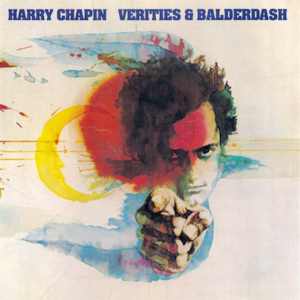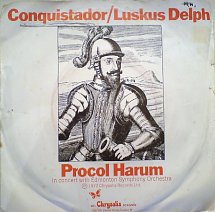"Six String Orchestra" is a song written, composed, and performed by Harry Chapin and released on his 1974 album Verities & Balderdash.
"Six String Orchestra" is a song written, composed, and performed by Harry Chapin and released on his 1974 album Verities & Balderdash.
The lyrics of "Six String Orchestra" are narrated by, and describe, a young man who buys a guitar, which he christens his "monophonic symphony six-string orchestra." He practices late in his room and is not disturbed, his mother saying he is "nothing yet to make the folks write home."
As the narrator tries to realize his aspirations of being a singer, his lack of talent becomes evident. He performs at talent nights to what amounts to polite applause, but is screamed off the stages when he tries to perform encores, and dreams about a group helping him out. The instruments, a bass guitar, a lead guitar, a drum set, and strings, all join him as he mentions each in the refrain. These all play along with him (and his singing improves) through the last line of the refrain, but just before "orchestra," they all stop, leaving him attempting to play.
The narrator's failures continue. Love songs he writes, composes, and performs for a girl he is trying to impress instead result in her excusing herself to find a bar before he gets to finish. A demonstration recording he mails to record companies is returned to him at least three times, twice marked "address unknown" and on a C.O.D. basis the third time. He also receives form letters from these record companies, whose suggestions include finding a trade where he will not be required to sing. The narrator even resorts to taking guitar lessons, but his teacher takes leave; the narrator explains, "It was something about a breakdown or needing a reprieve." He is undeterred and pledges to persevere.
Chapin's point is that the narrator of "Six String Orchestra" is ultimately doomed to failure in his ambitions to make his career in music because of a total lack of talent and complete inability to play the very guitar he has hoped will be his ticket to fame—a guitar of low price and even lower quality that the narrator does not even bother to keep in tune.
"Six String Orchestra," like the entire album Verities & Balderdash, was produced by Paul Leka, and performed by Chapin, on the album, as if it were part of a live concert. From time to time, audience laughter can be heard on the song, and Chapin deliberately plays his acoustic guitar poorly, and as if it were out of tune.

Harold Forster Chapin was an American singer-songwriter, philanthropist, and hunger activist best known for his folk rock and pop rock songs. He achieved worldwide success in the 1970s. Chapin, a Grammy Award-winning artist and Grammy Hall of Fame inductee, has sold over 16 million records worldwide.
"Scarborough Fair" is a traditional English ballad. The song, which is a variant of The Elfin Knight, lists a number of impossible tasks given to a former lover who lives in Scarborough, North Yorkshire. The "Scarborough Fair" variant was most common in the Yorkshire and Northumbria, where it was sung to various melodies, with refrains resembling "parsley, sage, rosemary and thyme" and "Then she'll be a true love of mine."

Dr. Teeth and the Electric Mayhem or simply the Electric Mayhem is the Muppet musical group that debuted on the pilot for The Muppet Show in 1975. They are the house band for The Muppet Show, with personalities and appearances inspired by prominent real-life rock music and jazz performers. Following The Muppet Show, they appeared in various Muppet films and television specials and have also recorded album tracks and covered numerous songs.

Verities & Balderdash is the fourth studio album by the American singer/songwriter Harry Chapin, released in 1974.. "Cat's in the Cradle" was Chapin's highest-charting single, finishing at number 38 for the year on the 1974 Billboard year-end Hot 100 chart. The follow-up single, "I Wanna Learn a Love Song," charted on the Billboard Hot 100 Singles Chart at number 44, and Billboard Adult Contemporary at number 7. A promotional single, "What Made America Famous?", was released to radio stations as a 45 rpm single. The album was certified Gold on December 17, 1974.

"Cat's in the Cradle" is a 1974 folk rock song by Harry Chapin from the album Verities & Balderdash. The single topped the US Billboard Hot 100 in December 1974. As Chapin's only number-one song, it became the best known of his work and a staple for folk rock music. Chapin's recording of the song was nominated for the 1975 Grammy Award for Best Male Pop Vocal Performance and was inducted into the Grammy Hall of Fame in 2011.

"The Boxer" is a song recorded by the American music duo Simon & Garfunkel from their fifth studio album, Bridge over Troubled Water (1970). Produced by the duo and Roy Halee, it was released as a standalone single on March 21, 1969, but included on the album nine months later. The song, written by Paul Simon, is a folk rock ballad that variously takes the form of a first-person lament as well as a third-person sketch of a boxer. The lyrics are largely autobiographical and partially inspired by the Bible, and were written during a time when Simon felt he was being unfairly criticized. The song's lyrics discuss poverty and loneliness. It is particularly known for its plaintive refrain, in which they sing 'lie-la-lie', accompanied by a heavily reverbed snare drum.

Time and a Word is the second studio album by English rock band Yes, released on 24 July 1970 by Atlantic Records. It was put together several months after the release of the band's 1969 eponymous debut, during which they continued to tour heavily and recorded Time and a Word during gaps between shows. Yes continued to follow their early musical direction of performing original material and cover versions of songs by pop, jazz, and folk artists. A small orchestra of brass and string session musicians was used on most of the album's songs.
"I Got Rhythm" is a piece composed by George Gershwin with lyrics by Ira Gershwin and published in 1930, which became a jazz standard. Its chord progression, known as the "rhythm changes", is the foundation for many other popular jazz tunes such as Charlie Parker's and Dizzy Gillespie's bebop standard "Anthropology ".
"The Third Man Theme" is an instrumental written and performed by Anton Karas for the soundtrack to the 1949 film The Third Man.

"Conquistador" is a song by the English rock band Procol Harum. Written by Gary Brooker and Keith Reid, it originally appeared on the band's 1967 self-titled debut album. It was later released as a single from the band's 1972 live album Procol Harum Live: In Concert with the Edmonton Symphony Orchestra. It is one of the band's most famous and popular songs and their third Top 40 hit on the U.S. Billboard Hot 100, peaking at number 16.
"A Better Place to Be" is a song by Harry Chapin from his 1972 album, Sniper and Other Love Songs. The song is about a midnight watchman confiding in a waitress, while drinking gin, about a woman that he met a week before and had a one-night stand with.
"30,000 Pounds Of Bananas," sometimes spelled "Thirty Thousand Pounds Of Bananas," is a folk rock song by Harry Chapin from his 1974 album, Verities & Balderdash. The song became more popular in its live extended recording from Chapin's 1976 concert album, Greatest Stories Live that started the phrase "Harry, it sucks." The song is based on an actual truck accident that occurred in Scranton, Pennsylvania, in 1965.
"Corey's Coming" is a song written and sung by Harry Chapin. It was released on his 1976 album On the Road to Kingdom Come.

This page is a discography for the singer and songwriter Harry Chapin. Chapin was a popular singer in the 1970s and 1980s. He achieved international success with a string of hits throughout the 70s and 80s. Chapin's career was cut short at its peak, when he was killed in a car accident in 1981. Shortly after his career debut in 1972, he became one of the highest paid artists in the world. All of his single releases managed to chart on at least one international chart.
Ghost Train: The Studio B Sessions is the 17th studio album of country music singer Marty Stuart. The album was long-awaited by fans of Stuart, as most of the songs had already featured on The Marty Stuart Show, Stuart's country/bluegrass show on RFD-TV. It was recorded in the historic RCA Studio B in Nashville, which was being used by the Country Music Hall of Fame as a type of museum until Stuart asked to use the "Home of a Thousand Hits" to record 'Ghost Train'.
John Grimaldi was a musician, songwriter and artist. He was born in St Albans, Hertfordshire, United Kingdom. Grimaldi was educated at St Albans School, where he developed his talent for electric jazz, songwriting and art. His career focused on the Jazz genre, although he played other genres as well. Grimaldi formed a number of bands and wrote and performed until his death from multiple sclerosis in 1983.

Muppets Most Wanted: An Original Walt Disney Records Soundtrack is a soundtrack album released by Walt Disney Records on March 18, 2014, for the musical comedy film Muppets Most Wanted. The soundtrack features six original songs, two re-recordings of popular Muppet songs, three cover versions of existing songs, an orchestral suite by Christophe Beck, five demos by Bret McKenzie, and eight dialogue tracks.
"I Wanna Learn a Love Song" is a song written and performed by Harry Chapin. The song was included on his 1974 album, Verities & Balderdash. The song is about a guitar teacher who gives guitar lessons to a woman who is falling in love with him.
"Halfway to Heaven" is a song written and performed by Harry Chapin. The song was included, but not released as a single, on his 1974 album, Verities and Balderdash. The song is based on a true conversation he had while at a train station about sexual morality.
"What Made America Famous?" is a song written and performed by Harry Chapin. The song was included on his 1974 album, Verities & Balderdash. It has also been included on numerous posthumous compilation albums. The song inspired Chapin to write the award nominated Broadway musical, The Night That Made America Famous.